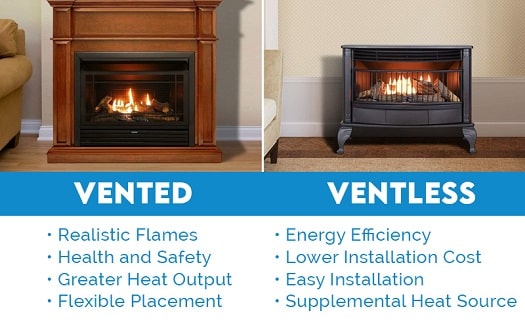When it comes to creating a cozy and inviting ambiance in your home, gas fireplaces have become a popular choice. They offer the warmth and aesthetic appeal of a traditional fireplace without the hassle of wood-burning. Within the realm of gas fireplaces, two main options dominate the market: vented vs. ventless gas fireplaces.
Each type of gas log setup has its advantages and disadvantages, and deciding between them is an important consideration for homeowners. Let's delve into the pros and cons of vented and ventless gas fireplaces to help you make an informed choice. Remember, if you need fireplace supply, PlumbersStock has you covered. We also have other fireplace help articles.
Vented Gas Fireplaces:

Pros:
- Realistic Flames: Vented gas fireplaces tend to produce more realistic flames, mimicking the appearance of a traditional wood-burning fireplace. This can create a more authentic and appealing ambiance.
- Health and Safety: Since vented fireplaces expel combustion byproducts outside through a chimney or vent, there is a lower risk of indoor air quality issues. Harmful gases such as carbon monoxide are directed away from the living space.
- Greater Heat Output: Vented fireplaces generate more heat than their ventless counterparts. This is especially beneficial in larger rooms or homes in colder climates, where efficient heating is essential.
- Flexible Placement: Because they require a chimney or vent, vented fireplaces offer more flexibility in terms of placement. They can be installed in a variety of locations within the home.
Cons:
- Installation Costs: Vented fireplaces are generally more expensive due to the chimney or vent construction requirements. This can be a significant factor for homeowners on a budget.
- Limited Efficiency: While they produce realistic flames, vented fireplaces may be less energy-efficient than ventless models. Some heat generated may escape through the chimney, leading to higher heating costs.
- Chimney Maintenance: Regular chimney maintenance is necessary to ensure proper functioning and safety if you opt for a vented fireplace. This includes inspections, cleaning, and potential repairs.
Ventless Gas Fireplaces:
Pros:
- Energy Efficiency: Ventless fireplaces are highly efficient since they don't lose heat through a chimney or vent. Their heat stays within the room, making them a cost-effective heating option.
- Lower Installation Costs: Without the need for a chimney or vent, ventless fireplaces are generally less expensive to install. This makes them a more budget-friendly choice for homeowners.
- Easy Installation: Ventless fireplaces can be easily installed, often as freestanding or wall-mounted models. This simplicity can be appealing to those seeking a hassle-free installation process.
- Supplemental Heat Source: Ventless fireplaces work well as supplemental heat sources in small to medium-sized rooms. They provide warmth and ambiance without the need for a traditional heating system.
Cons:
- Indoor Air Quality: One of the main concerns with ventless gas log fireplaces is indoor air quality. Since they release combustion byproducts into the living space, there is a potential risk of increased humidity and the release of pollutants.
- Moisture Accumulation: The combustion process in ventless fireplaces produces water vapor, which can lead to moisture accumulation within the home. This might cause issues like mold growth or damage to walls and furniture.
- Flame Realism: Ventless fireplaces may not always offer the same level of realism in flames as vented models. The flames can appear less natural and might not be as visually pleasing.

Save at PlumbersStock on HVAC
Choosing between a vented and ventless gas fireplace ultimately depends on your priorities and the specific needs of your home. If authenticity and greater heat output are essential, a vented fireplace might be the way to go. On the other hand, if cost-effectiveness and easy installation are your priorities, a ventless fireplace could be a better fit. When deciding, consider factors such as indoor air quality, heating requirements, budget, and maintenance obligations. Regardless of your choice, both options can provide a wonderful addition to your home, creating a warm and inviting atmosphere for you and your family to enjoy.



